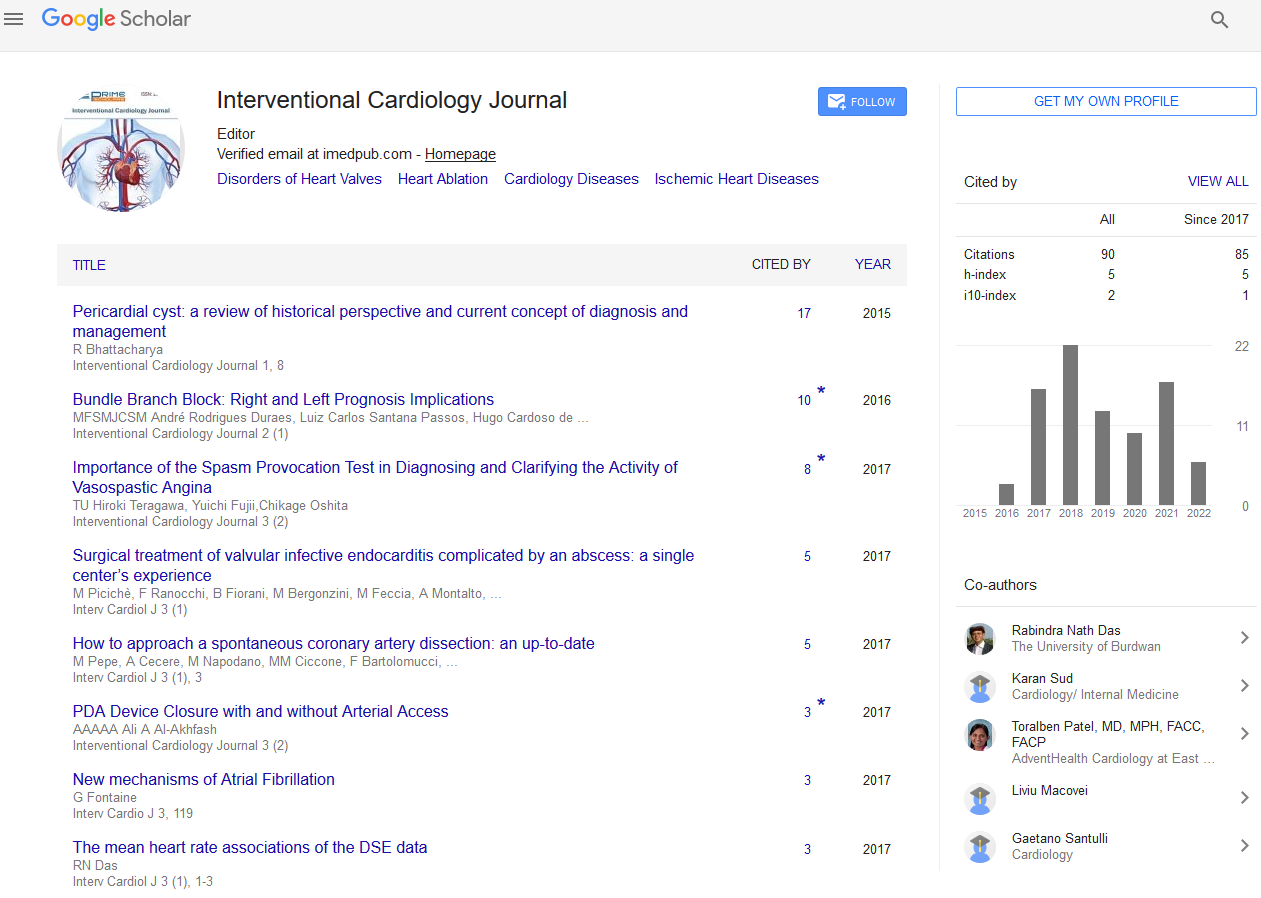Bharathi Bhusurapalli*
Department of Pharmaceuticals, QIS College of Pharmacy, Ongole, Andhra Pradesh, India
*Corresponding author:
Bhusurapalli B
Department of Pharmaceuticals, QIS College of Pharmacy, Ongole, Andhra Pradesh, India Tel: +91 7675058640
Tel: +91 7675058640
Email: bharathibhusurapalli301@gmail.com
Citation: Bhusurapalli B (2021) A Short Note on Neuro-Cardiology. Interv Cardiol J Vol.7 No.2:116
Neuro-cardiology is defines the pathophysiological reciprocal action of the both nervous and cardiology system. The constant communication between the heart and brain has the invaluable to multidimensional fields of the both neurological and cardiology. Clinical management of the heart and brain related diseases cannot be viewed in isolation. Cardiac issues often influence the intense care of neurologic patients. A brain–heart link is more known to cardiologists than the neurologists. This chapter provides some insight into the pathophysiology of these pathologic neuro-cardiac states and their most appropriate management relevant to neurologists.
From the past few years, the increasing chances of the heart brain interaction with major potential involvement for treatment of cardiovascular diseases. The cerebrovascular accidents and transient ischaemic attacks are usually caused by cardiac arrhythmias or congestive cardiac failure. In some specific atrial fibrillation is a risk factor for in cognitive risks proceedings the occurrence of transient ischemic attack and cardiac arrhythmias. Even in the absence of manifest stroke atrial fibrillation is a disease risk for cognitive impairment. The short term ischemic stroke is an involving cardiovascular disease with frequent cardiac causes and cerebral consequences thus the close cooperation with the neurologists and cardiologists is need for the optimal patient management. Furthermore recent randomized trials denoted that catheter based thrombectomy is the most effective treatment for properly selected patients. Interventional cardiology with its common non-stop services are used for acute myocardial infarction, it can fill the existing gaps in coverage of population needs with neuro-interventional diseases only.Thus a new future medical record of sub specialization may emerge with the neuro-cardiology or cardio-neurology.
The future of therapeutic approaches in neuro-cardiology lies both in novel treatment as in applying scientific integrative medical ideas that takes into account concurrent chronic degenerative and vascular disorders and interactions of multiple drug and non-drug treatments. In this respect vagal stimulation, exercise training, electrical neuro-stimulation, music therapy and recently renal denervation have become an interesting options in the treatment of angina pectoris, heart failure, and hypertension etc. Various patient groups may have benefit when the appropriate mechanisms of an interrelation between the nervous system, brain and heart become elucidated. Endogenous ligands released from ischemic neurons can activate TLR signaling pathways while release of systemic proinflammatory mediators can activate microglia, resulting in further release of inflammatory cytokines and secondary inflammatory-injury.
Strokes can also occur in setting of cardiac interventions such as cardiac catheterization and coronary artery bypass procedures. Treatment to prevent recurrent stroke in any of these setting depends upon the underlying etiology. Whereas the anticoagulation with the vitamin K antagonists is proven to be superior to acetylsalicylic acid for stroke prevention in atrial fibrillation the superiority of anticoagulants has not been conclusively established for the stroke associated with congestive heart failure and is contraindicated in those with infective endocarditis. Improving of understanding about the mechanisms regulating postoperative brain injury and cardiovascular changes will aid in the development of appropriate therapeutic measures for cardiac surgery patients. Carefully management of the operation period and favourable cardiopulmonary bypass conditions as well as control of temperature, flow rate, Ph. and the total volume of blood levels can reduce the risk of cerebral infarction and thus avoid autonomic nerve damage and improve the prognosis of patients with cardiac surgery. Similarly the furthering about the understanding of the brain-heart axis and how the brain lesions result in dynamic changes in ECG and HRV is important for facilitating the treatment of the clinical symptoms in patients with brain injury after cardiac surgery.

